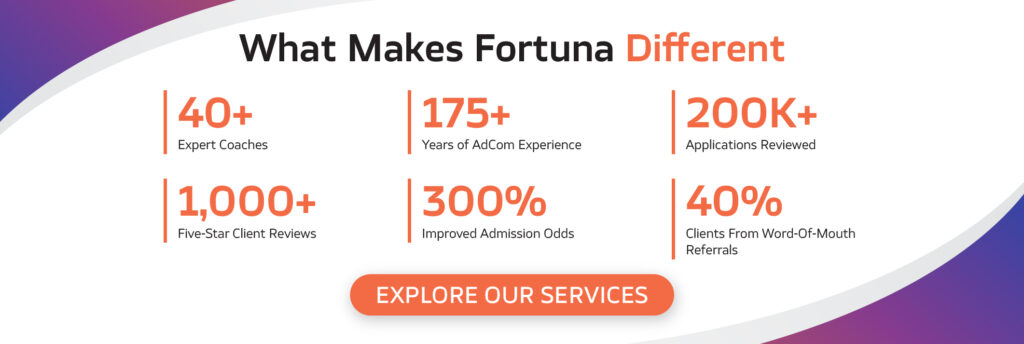The Oxford MBA essays for 2025–26 include a supporting statement (250 words), a detailed current role description (up to 5,000 characters), and a series of career-planning questions. Together, these essays give the admissions committee a full picture of your professional scope, ambitions, and values.
To succeed, focus on clarity, authenticity, and purpose. The supporting statement is your chance to highlight something special that you bring to the MBA programme; the role description adds depth and context to your CV; and the career plan questions test your direction and realism. Strong answers are specific, well-structured, and show how you’ll use Oxford to create impact.
Ultimately, Oxford wants to admit candidates who can bring their experiences into the classroom and then translate them into meaningful change beyond it. If you approach each section with focus and self-awareness, you’ll align with the school’s mission of impact from within.
Keep reading for a breakdown of the 2025–26 Oxford Saïd MBA essay questions, strategies for crafting strong responses, and examples to guide your writing.
How to Answer the Oxford MBA Supporting Statement?
Prompt: Tell us something that is not covered in your application which you would like the Admissions Committee to know about you. (Maximum 250 words)
The best way to approach this question is to work through the rest of the application first – for example your CV, detailed role description, and career plan questions in the application form, which cover your professional path, achievements, and ambitions. Once those sections are complete, you’ll have a clearer view of what’s missing.
Choose One Strong Story or Theme
The most compelling Oxford supporting statements don’t try to do everything. Instead, they zoom in on one distinctive aspect of who you are – something the committee wouldn’t otherwise learn from your CV or the other sections of the application.
Think about a moment or experience that reveals your character, values, and potential in a way that complements your professional record. Your story doesn’t have to be career‑focused; in fact, some of the most memorable responses come from outside the workplace. What matters is that it feels authentic and shows qualities that Oxford values in future leaders.
You might choose:
- A formative experience that shaped your worldview or inspired your drive for impact.
- A leadership role outside of work – perhaps in a volunteer organization, a community initiative, or a sports team – where you influenced others and created positive change.
- A cross‑cultural or international challenge that tested your adaptability and collaboration skills.
- A personal passion that demonstrates resilience, creativity, or courage, and shows how you pursue excellence beyond your professional life.
Whatever you choose, make sure the story has depth. Don’t just state what you did – explain why it mattered, what you learned, and how it reflects the person you are today. A focused, vivid narrative will stay with the reader far longer than a checklist of achievements.
When to Address a Red Flag
For most applicants, this essay is best used to highlight something new and distinctive.
However, if you have a potential concern in your profile – such as a low GPA, you may need to use part of this space to provide context.
If you do, keep the explanation brief and factual (around 50–100 words). Acknowledge the issue and offer a concise rationale or mitigating factor (for example, strong performance in recent quantitative coursework). This way, you reassure the Admissions Committee about the concern while still leaving room to showcase what makes you a compelling candidate.
Key Takeaways
- Look for the gaps. Review your application thoroughly and choose something that hasn’t been covered elsewhere.
- Tell one strong story. A focused, well‑developed anecdote has far more impact than a broader narrative.
- Be personal and authentic. Reveal what drives you and what you’ll bring to the Oxford MBA community.
- Use your words wisely. With only 250 words, every sentence should add insight and depth.
Want more insight on the Oxford MBA?
Check out our video conversation with Oxford Saïd’s Liam Kilby and alum Devin Russell, hosted by Fortuna’s Matt Symonds.
Hear how Oxford Saïd combines a one‑year format with a collaborative culture, a unique college system, and a powerful global network – while preparing students for diverse careers and lasting impact.
How to Answer Oxford’s “Current Role” Question?
Prompt: If you are in full-time employment, define your current role. Please list your main responsibilities, your most significant challenges, and greatest achievement. (5000 characters max)
This question is less of an essay and more of a professional brief. While Oxford’s supporting statement is only 250 words, here you’re given up to 5,000 characters – enough space for a full page and a half of detail, or about 800 words. The Admissions Committee wants a clear, accurate picture of your professional scope: what you do, the scale of your impact, and how you’ve grown.
Define Your Role
Your CV provides the headlines in bullet points; here, you have the opportunity to add texture, context, and meaning. Describe your role in clear, straightforward language. Remember that not every reader will be familiar with your industry or company, so avoid jargon and spell out the essentials: your title, where you sit in the organization, the size of the team you manage (if applicable), the scale of the budgets or portfolios you oversee, and the types of stakeholders you work with.
Describe Your Main Responsibilities
The next part of the question is explaining your responsibilities. This isn’t about reciting your job description but about explaining what you actually own and drive. Admissions officers want to see leadership and accountability: where you make decisions, what outcomes you’re responsible for, and how your remit has evolved.
Describe Your Most Significant Challenges
The section on challenges is particularly important. Choose one or two examples that highlight your ability to problem-solve under pressure, manage complexity, or navigate organizational dynamics. Describe how you approached the situation, the strategies you used, and what you learned. Oxford wants to understand not only what you do when things go right, but how you operate when things are tough.
Showcase Your Greatest Achievement
A strong example for your greatest achievement is one where you can clearly articulate the “so what” – why it mattered to your organization, what measurable results you delivered, and how your leadership was critical to success. Wherever possible, quantify your impact. For example, don’t just say you led a new product launch – explain the market it reached, the revenue it generated, or how it transformed a client relationship.
Focus on painting a credible, professional portrait that demonstrates readiness for the MBA and a trajectory of leadership potential.
Key Takeaways
- Keep it professional and straightforward: clarity matters more than style.
- Show scope, scale, and impact, not just a list of duties.
- Use challenges and achievements to highlight problem-solving and leadership.
- Quantify results wherever possible to demonstrate tangible impact.
- Think of this section as the “expanded CV” that provides important context and detail.

How to Approach Oxford’s Post-MBA Plans Question?
In addition to the supporting statement and role description, the Oxford MBA application requires a series of short, focused answers about your post-MBA career plans, each with a word count of 1250 characters, or about 200 words. The exact questions vary depending on whether you indicate employment, entrepreneurship, family business, returning to your current employer, or “other.” Each pathway has its nuances, but all of them ask you to define your goals, explain how you will prepare, and show how Oxford fits into your trajectory.
Why Does Oxford Ask About Post-MBA Career Goals?
Oxford push candidates to be this specific because it aligns with the school’s mission of impact from within. Saïd believes that business leaders have a responsibility not just to advance their careers but to tackle the world’s pressing challenges, from climate change to the AI revolution. By asking you to lay out immediate post-MBA plans in detail, the admissions team is looking for evidence that you have thought seriously about how you will translate your experience and an Oxford MBA into purposeful impact – whether in a corporate role, a start-up, or your family enterprise.
What Does Oxford Look For in the Career Goals Questions?
Across all pathways, the committee wants to see three things: clarity of direction, realism, and evidence of research. Vague aspirations won’t cut it. You need to identify a specific role, sector, and geography, explain how recruitment works in that space, and show you’ve done the groundwork to understand both the opportunities and the obstacles. If you’re pursuing entrepreneurship or a family business, you should demonstrate traction – what you’ve already accomplished, how the MBA will help, and what you’ll do to prepare before enrolling.
Finally, Oxford’s emphasis on alternative plans underlines the importance of resilience. Having a Plan B doesn’t make your primary goal weaker; it shows adaptability and pragmatism. For a school that prides itself on developing leaders who can shape industries and communities, this flexibility is essential. Oxford wants to admit candidates who are ambitious but grounded, driven by purpose but capable of navigating change.
Key Takeaways
- Oxford’s detailed post-MBA questions reflect its mission of impact from within: shaping leaders who will transform business and society.
- Be specific: roles, sectors, and geographies must be clearly defined.
- Demonstrate research: show you understand recruitment dynamics or industry trends in your chosen path.
- Acknowledge challenges and present both preparation steps and credible alternatives.
- Use these short essays to show not just ambition, but purpose and adaptability – qualities Oxford values deeply.
Let’s Get You Into Oxford Saïd
Fortuna Admissions is a dream team of former MBA admissions decision-makers from top schools. We know what it takes to stand out because we’ve made the admit decisions ourselves. Whether you need help refining your story, strengthening your essays, or navigating interviews, we’ve got you covered.
Our free consultations are consistently rated the best in the industry – and they’re a great way to get personalized advice and honest feedback on your profile. Book your free session with us today.




